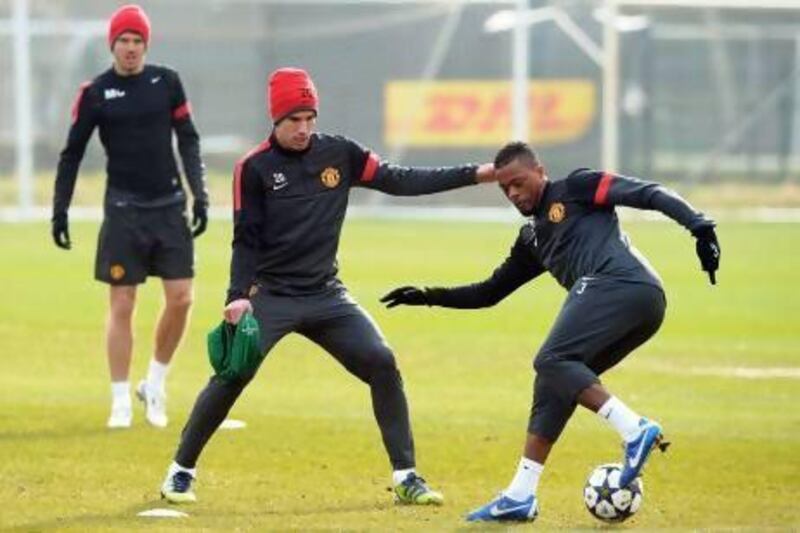There is a game Sir Bobby Charlton likes to play which he never wins. Manchester United's record goalscorer and director tries to guess Sir Alex Ferguson's next team selection. Getting all 11 names right, however, is beyond even an Old Trafford insider.
So what chance, then, does a rival manager, even a master psychologist like Jose Mourinho, have?
When Real Madrid arrive at Old Trafford tomorrow, they may have a United team in mind. The reality, though, is that nine names will be accompanied by two question marks, an uncertainty that affects both formation and style.
In the midfield and forward positions, they can suppose Michael Carrick, Danny Welbeck, Wayne Rooney and Robin van Persie will start.
With Phil Jones ruled out with an ankle injury, Ferguson will be perming two from Tom Cleverley, Anderson, Ryan Giggs, Ashley Young, Antonio Valencia, Shinji Kagawa and Nani.
The consequence is that Rooney could be on either flank or just behind Van Persie. Ferguson may have two or three genuine central midfielders.
Practically the only guarantee is that the resident super-sub, Javier Hernandez, will be held in reserve.
While some become more set in their ways with age, Ferguson grows more unpredictable, preserving the element of surprise.
He can set his side up to counter opponents, as he has done against Chelsea, Manchester City and Liverpool in the Premier League.
Other managers find it harder to do likewise. Second-guessing Ferguson is no simple task.
The side that beat Norwich City 4-0 on Saturday was stronger than expected: few anticipated Rooney, Van Persie and Carrick all starting while Ferguson, typically, threw a curveball by saying Giggs, who was not even on the bench, would feature.
Picking and choosing the games for his veterans, the 39-year-old Giggs and the 38-year-old Paul Scholes, is one reason why managing United has become a job for a strategist.
So are the circumstances. Ferguson does not have the array of genuine superstars that the top Spanish sides - or, arguably, the finest German teams - now possess. United's finances have not permitted it. Between the £80 million (Dh441.6m) sale of Cristiano Ronaldo in 2009 and the arrivals of Van Persie and, to a lesser extent, Kagawa, last summer, they were not signing players at their height of their powers or with a commensurate cost.
The criticism was that they ended up with quantity, not quality. Yet Ferguson has strength in depth and the ability, which many of his managerial counterparts lack, to ensure everyone contributes.
Nani had been perhaps United's most disappointing player this season but he was responsible for progress against Reading in the FA Cup; Kagawa, until then struggling for goals, delivered a hat-trick against Norwich; Young, otherwise underwhelming, was excellent in the most significant league game of the campaign, the 3-2 win at Manchester City.
They exist in a world of permanent rotation. Even in the centre of defence, a department most managers leave untouched, Ferguson tinkers, partly because of the creaking frames of his veterans.
Nemanja Vidic is the most resolute choice for domestic matches.
Jonny Evans and Rio Ferdinand, more mobile and less likely to concede free kicks, should get the nod tomorrow.
It all explains why only Carrick, Van Persie and Patrice Evra have started more than three-quarters of the league games, and why, when United are confirmed as champions, this will have been a genuine triumph of the entire group.
Ferguson believes his squad is deeper than his pool of players in 1999 and that, the treble-winning campaign, was notable for decisive, dramatic contributions Teddy Sheringham and Ole Gunnar Solskjaer made from the bench in the Champions League final.
The corollary is that the squad is stronger but the first-choice side weaker. The difference is most pronounced in the centre of the park.
Any opponent in a major match 14 years ago could have predicted the presence, if fit, of Roy Keane, David Beckham and Giggs, accompanied by either Scholes or Nicky Butt. Each was aged between 24 and 28, players at their physical peak whose athleticism was married with technical ability and a fierce competitiveness.
Instead of the masters, Ferguson now has mix-and-match midfields, where only Carrick is an automatic choice, where there could be four men or five, where a diamond system is occasionally deployed, where most of the many options are flexible enough to occupy two or three roles.
When a defender like Jones plays in midfield to help halt Gareth Bale or Marouane Fellaini, it can indicate an inferiority complex.
If the out-of-form Valencia, the best defensive right winger, is included to help Rafael deal with Ronaldo, or Rooney is again sacrificed to track his former partner in crime, it will suggest that United are more worried about Madrid than vice versa.
Truth be told, Ferguson's tactics have long entailed the tacit acceptance that United cannot simply send a side out to blow their rivals away.
Instead, it becomes a question of cunning, of bluff and double bluff, of deciding which cards to play. Manchester United against Real Madrid is football at its finest. For Ferguson, looking to outwit Mourinho, it is also a game of poker.
Follow us
[ @SprtNationalUAE ]






